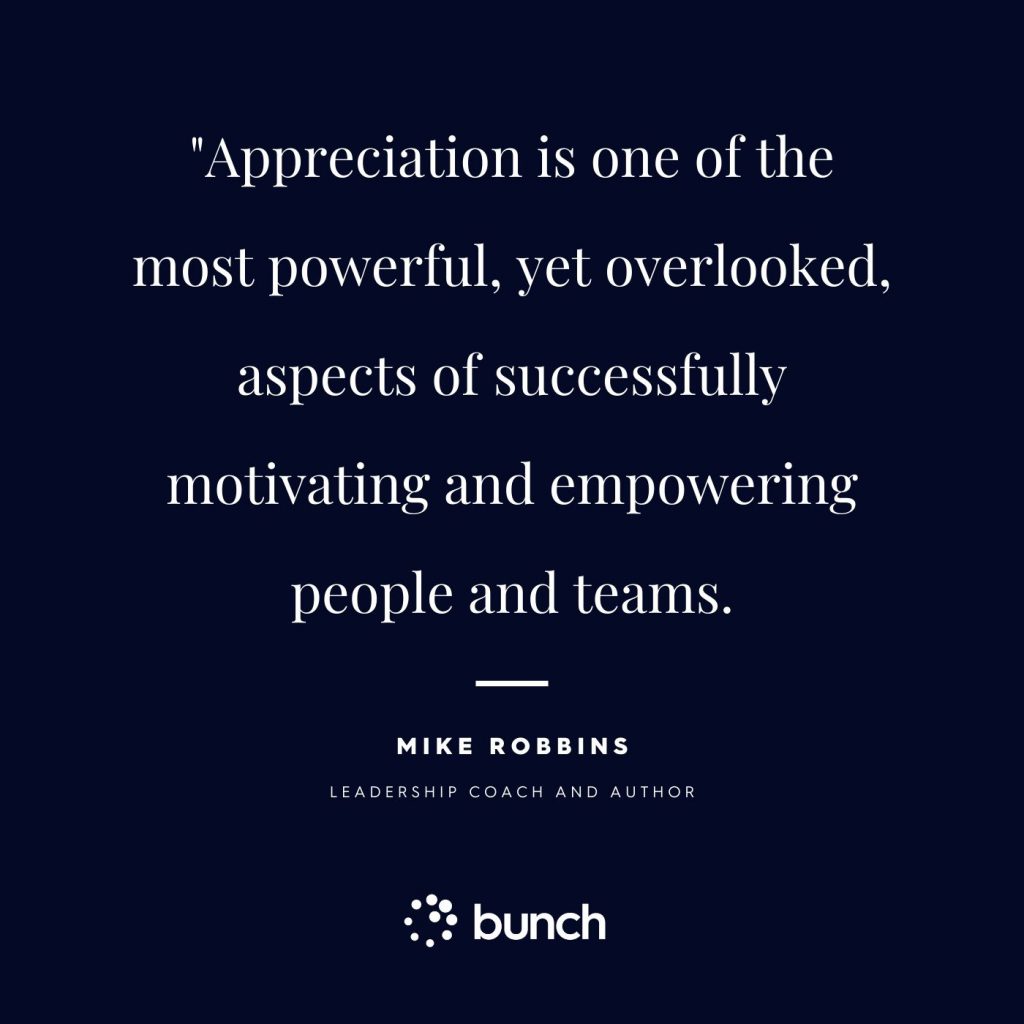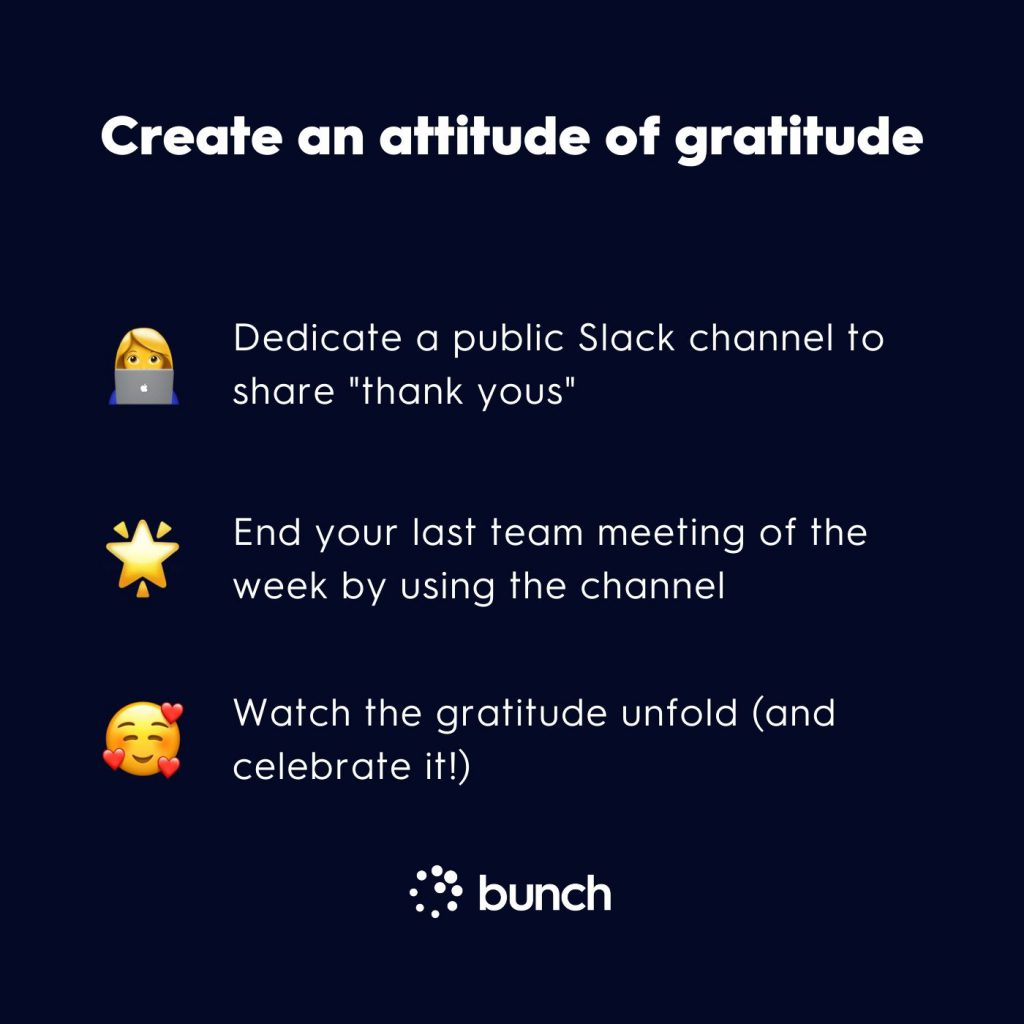2020 has presented an opportunity to share in the human experience like never before.
The murder of George Floyd and subsequent protests around the world have spurred millions to take anti-racist action. Coronavirus has encouraged us to consider a world in which we pause, and take care of each other. In business, personal and professional has merged more than ever before. It had too. Now is the time to appreciate your team members, so you can band together and make the changes that the world needs.
“What if 2020 is the year we’ve been waiting for? A year so uncomfortable, so painful, so scary, so raw — that it finally forces us to grow,” – Leslie Dwight
It’s time to shift the focus away from just “getting the job done.” Over the past few months, we’ve talked about the shape of the “new normal” and the tools we need to make our new work dynamics function. Teams have adapted to new environments and processes, which is something to celebrate. But do you actively appreciate your team?
As Margaret Cousins once said: “Appreciation can make a day, even change a life. Your willingness to put it into words is all that is necessary.”
In his TEDx talk, The Power of Appreciation, Mike Robbins asserts that “64% of people leave their jobs because they don’t feel appreciated or valued,” which is telling, but not completely surprising. Most leaders don’t consciously try to under-appreciate their teams, but it’s often a side effect of getting sh*t done. The good news is, it’s easy enough to put a few steps in place and start making your team feel the love. Aww.

Struggling to find ways to appreciate your team? We get it! You can get daily tips on this and other challenges leaders face in the Bunch app.
But wait! What’s the difference between recognition and appreciation?
Recognition and appreciation are related but not the same thing. Recognition is a positive reward for a specific result or performance. Feels great; often short-lived. Like being awarded employee of the month. Sure, you got a little dinosaur trophy, but it’s fleeting praise.
Appreciation at work is more expansive and all-encompassing than recognition. It’s a safe feeling of knowing you are unconditionally valued. It’s about celebrating people over actions, and both are necessary to create and maintain high-performing, motivated, and happy teams.
“Okay,” you say, “but then how do I genuinely and wholeheartedly show thanks to the people working their tails off in my team?”
Great question. We’re here to give you concrete things you could do today to appreciate them. These insights vetted by actual leaders will show you how to integrate more thanks into your day-to-day.
We’ve also added a handy memo upfront so you can see if the tip will be useful for you. You don’t have to thank us (but you’ll know how once you read these tips).
Alrighty, hit me with the feels.
Care Deeply and Challenge Directly
Ideal for:
- Leaders looking for a long-term strategy on how to blend appreciation into the feedback loop.
- Teams of 1 – 1000+ (all sizes)
Appreciating someone at work means you care enough to give them honest, candid feedback.
Kim Scott, author of Radical Candor, has (literally) written the book on sharing feedback effectively. The core message comes down to caring deeply: one of the four Radical Candor axes. When you care deeply and challenge directly, you can give your team feedback in a genuine and impactful way.
The Radical Candor framework: trademarked by Kim Scott
“‘Caring Personally’ is at its core common human decency. You don’t have to have a deeply personal relationship to have this as your point of departure. But if you work closely with somebody — if, for example, you are somebody’s boss — you need to begin to develop a positive human relationship with that person.”
On this podcast, Kim talks directly about how showing more appreciation can make work fun.
The Bunch app brings together mental models like this one from Kim Scott and shows you how to take action – all in under 2 minutes.
Set a standard and reward everyone who meets it
Ideal for:
- Leaders who need new tools to keep their teams motivated.
- Use in 1-on-1s.
Mark C. Crowley knows first-hand how big a role appreciation plays in successful organizations. Mark believes that the most important element of group appreciation is that everyone involved is appreciated and recognized as having a part to play in success. He says, by not recognizing everyone in the team’s contributions you are breaking their spirit and their motivation.
The Five B’s of Motivation is one way you can incorporate a feedback and reward framework in your weekly 1:1s:
Love these tips? Get the leadership coach today & access exclusive tips from the world’s most influential leaders.
Send a physical sign of appreciation to your team
Ideal for:
- Leaders of remote teams (at the moment, everyone).
- Times when a physical connection is much needed
Whether you’re remote, or just have teams or people based in different offices, showing appreciation at work is harder without rubbing shoulders in an office. Trying to recreate office norms from afar can be part of how you show your appreciation. Take Dennis Field at Invision which has a 700+ strong remote team – he shows appreciation to his team in a variety of small, but meaningful ways.
“If I want to thank a colleague for going above and beyond, it’s pretty easy to treat them to a coffee or lunch if we’re in the same building, but for InVision we’ve had to use tools like Bonusly, our employee recognition, and rewards solution, to help encourage these interactions.” – Dennis Field, Invision
Our take: There are some epic direct-to-consumer gift services, coffee subscriptions, and so on that make for a very relevant token of thanks to show you appreciate your team. Sending a handwritten note might be the most simple and thoughtful gesture of all. Many companies have budgets set aside for precisely this type of appreciation. If yours doesn’t, why not suggest one?
Cultivate an attitude of gratitude at work
Ideal for:
- Leaders who want to encourage peer-to-peer gratitude.
- Larger teams with less time for individual or regular attention.
- Leaders looking for tactical ways to appreciate their team.
A 2010 study found that “expressions of gratitude increase prosocial behavior by enabling individuals to feel socially valued.” Meaning, a little thanks goes a long way to increase motivation, happiness, and cooperation within teams – because science says so!
By showing gratitude to your co-workers, team members, and higher-ups, you are mindfully contributing to a more positive work environment. It’s a win-win.
One fascinating case study into the impact of gratitude in the workplace comes from Humatics. CEO David Mindell started a ‘Thank-You’ channel in Slack after one particularly thankful All-hands — Mindell says the impact the channel has had on the business has been both profound and exciting.

The takeaway: Appreciating your team is not a one-and-done checkbox. And, it is something much bigger than sending a bag of coffee beans. It is a combination of regular spoken and demonstrated gratitude for their personal contribution.
Tell your team you appreciate them today. Thank them for their hard work and see what happens. Oh, and let us know! We’d really appreciate it.
Love this article? Learn more about appreciation with these resources:
- Learn how these super-epic Slack integrations can help increase praise and appreciation
- 9 Simple Techniques Any Leader Can Use to Show Employees Appreciation
- Like facts and figures? See how the stats stack up in the workplace in this report by the American Psychological Association.
- Top 10 Ways to Show Your Appreciation to Employees
- Slack: A few ways to keep employees happy and engaged
- Trello Gives Thanks To Their Team
Love these tips? Get the leadership coach today & access exclusive tips from the world’s most influential leaders.




